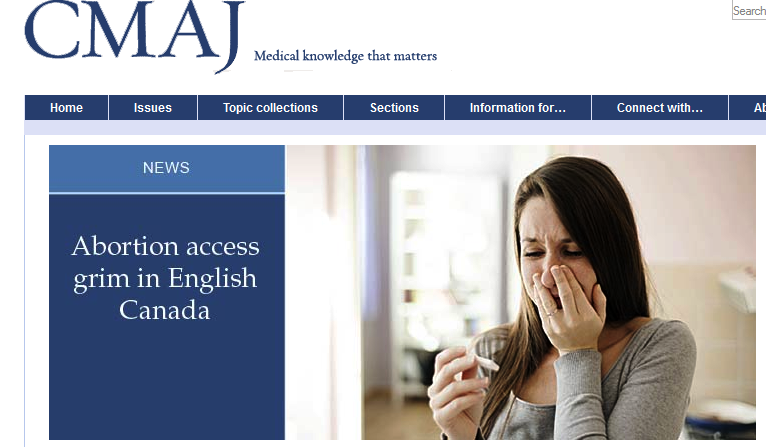The Canadian Medical Association Journal has published an article that shows how access to abortion in English speaking Canada falls behind that of Quebec. The article covers researchers, funded by the Society of Family Planning, who presented their preliminary findings of a study on access to abortion at the Family Medicine Forum in Quebec City on Nov. 12. What they found was that of the 94 abortion facilities across Canada, 46 of them are in the Province of Quebec. They claim that Quebec is a leader in “equitable access” with half of its abortion facilities in rural areas and at least one facility in every health region.
What the CMAJ article and the study are really aiming at, however, is raising the issue of “medical abortion”.
Researches claim that the poor access to surgical abortion in other provinces “puts [women] at higher risk of having a second trimester abortion and its associated complications. And for those without the resources or time to navigate the system, it may mean carrying an unwanted pregnancy to term.”
Co-investigator Dr. Edith Guilbert, a senior medical advisor at the National Institute of Public Health of Quebec had this to say:
Increasing access to medical abortion — that is, abortion induced by oral medication — could close some of the gaps in rural access because a local family doctor could administer the drug. “It saves women having to travel. It saves them having to undergo a surgical procedure.”
The article goes on to say that Health Canada has been considering approval of mifepristone (known as RU-486) since December 2012.
According to a recent CMAJ commentary (2013;186:13-14), the drug is considered the gold standard for inducing safe and early non-surgical abortion.
What they don’t, of course, mention are the deaths, complications and horrendous health hazards that have befallen women and their unborn children in BC, the US and around the world.
Three pro-abortion feminists wrote an incredibly well researched book entitled “RU486 – Myths and Misconceptions” in 1992, describing RU-486 as a “new form of medical violence that endangers women’s lives and violates their right to be free from bodily harm”.
One of the authors, Renata Klein, wrote an open letter to MPs in Australia in 2005 , stating that:
“Then, as now, some of you will be astonished that as an internationally recognized feminist and academic who has worked on reproductive issues for 25 years and strongly supports a woman’s right to safe legal abortion, I will side with what are seen as conservative and anti-abortion views.
However, then, as now, I cannot support the view that chemical abortion is seen (a) as good reproductive choice for women, and (b) as a safe alternative to already available abortion by aspiration. I write to you because I am appalled by the misinformation given to the public by supporters of RU-486, who continue to claim chemical abortion is safe, and who portray it as a simple procedure; take three RU486 pills and –bingo! You are no longer pregnant.”
Any person who would dare to support chemical abortion, RU-486, must read this book and the other real-life testimonies of women who have suffered the days, even weeks, of agony and gore as a result of this monstrous chemical concoction.

I wonder if the medical profession is really as strong abortion advocates as the CMAJ would suggest it is.